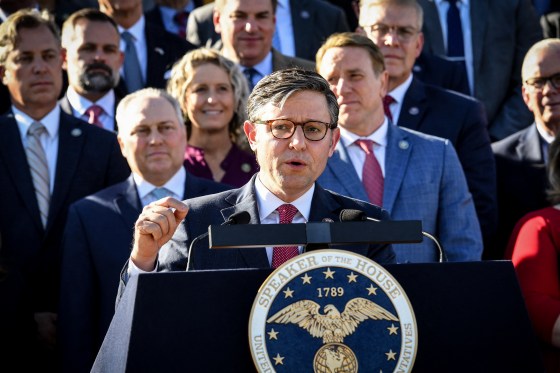
Mike Johnson was re-elected as Speaker of the House on Friday after overcoming internal Republican divisions, a feat achieved partly through President-elect Donald Trump’s intervention.
However, Johnson now faces an uphill battle leading a deeply divided Congress with the narrowest House majority in nearly a century.
Johnson’s re-election marked the conclusion of weeks of infighting among House Republicans, who initially struggled to unify behind a single candidate. Early in the process, Johnson faced opposition from two GOP members who were skeptical of his leadership.
However, Trump’s personal involvement, which included phone calls and public endorsements, helped sway the holdouts. Johnson ultimately secured the necessary votes to retain the gavel, presenting a moment of victory for the GOP amid its internal tensions.
“Mike Johnson is a principled and strong leader who has my complete and total support,” Trump said in a statement on Truth Social prior to the vote. His endorsement proved decisive, as the party rallied behind Johnson to avoid further delays and public embarrassment.
By Friday evening, Johnson expressed gratitude for the support and vowed to bring unity and effectiveness to the House chamber.

“This is not about one individual; this is about delivering results for the American people,” Johnson said during his acceptance speech. “We have significant challenges ahead, and I’m confident we can overcome them together.”
Despite his re-election, Johnson will face a legislative environment rife with challenges. The Republican Party’s razor-thin majority — the slimmest in nearly 100 years — leaves little room for error.
Johnson will need to manage competing priorities within his party, ranging from hardline conservatives pushing for drastic spending cuts to moderates concerned about maintaining bipartisan cooperation.

These internal divisions could complicate efforts to pass critical legislation, including funding bills to avoid a government shutdown and addressing the nation’s growing debt ceiling.
Adding to the pressure, Democrats have signaled their intent to hold Johnson accountable for his party’s actions and policy decisions.
House Minority Leader Hakeem Jeffries (D-N.Y.) congratulated Johnson on his re-election but warned that Democrats would vigorously oppose any efforts that undermine progress or stability.

“We are ready to work with the speaker when it benefits the American people,” Jeffries said. “But we will not hesitate to challenge policies that take us backward.”
Johnson’s leadership will also be tested on issues such as immigration reform, national security, and healthcare — topics that have long divided Congress. The speaker’s ability to navigate these issues will likely determine whether the House can function effectively in the coming months.
One of the immediate challenges Johnson faces is rebuilding trust within his own party. The prolonged speaker selection process exposed deep fractures among Republicans, with factions clashing over leadership styles and policy priorities.

Johnson’s success will hinge on his ability to bridge these divides and foster a sense of unity, particularly as the 2024 elections approach.
Political analysts have noted that Johnson’s re-election highlights Trump’s continued influence over the Republican Party. The former president’s endorsement was seen as a litmus test for GOP loyalty, reinforcing Trump’s grip on the party’s direction.
However, critics argue that this dynamic could limit Johnson’s ability to govern independently, especially if Trump’s agenda conflicts with broader Republican goals.

As Johnson assumes his role as speaker, many in Washington are watching closely to see how he balances party loyalty with the responsibilities of governing.
His ability to lead effectively will not only shape the immediate future of the House but also set the tone for the Republican Party heading into a critical election year.
For now, Johnson appears optimistic about his ability to navigate the challenges ahead. “The American people deserve a government that works for them, not against them,” he said in closing remarks. “We have an opportunity to rise above the noise and focus on what truly matters.”

Only time will tell if Johnson’s leadership can unify his party and deliver on the promises made during his tenure as speaker.
The road ahead is uncertain, but one thing is clear: Johnson’s re-election is only the beginning of a much larger battle to govern effectively in one of the most contentious political climates in modern history.



